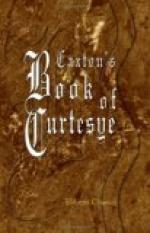[Footnote 1: Mr Bradshaw was kind enough to copy the rest, and to read the whole of the proof with Caxton’s original.]
[Footnote 2: I must be excused for not having found the poem before, as it is not in the Index to Mr Coxe’s Catalogue. In the body of the work it is entered as “A father’s advice to his son; with instructions for his behaviour as a king’s or nobleman’s page. ff. 88, 89, 78. Beg.
“Kepeth clene and leseth not youre gere.”]
[Footnote 3: The Treatises in The Babees Book, &c., and the Index at the end, should be consulted for parallel and illustrative passages to those in Caxton’s text.]
On this latter point Mr Skeat writes:
“The Oriel copy is evidently the best. Not only does it give better readings, but the lines, as a rule, run more smoothly; and it has an extra stanza. This stanza, which is marked 54, occurs between stanzas 53 and 54 of the other copies, and is of some interest and importance. It shows that Lidgate’s pupil, put in mind of Lidgate’s style by the very mention of his name, introduces a ballad of three stanzas, in which every stanza has a burden after the Lidgate manner. The recurrence of this burden no doubt caused copyists to lose their place, and so the stanza came to be omitted in other copies. Its omission, however, spoils the ballad. Both it and the curious lines in Piers Ploughmans Crede,
“For aungells and arcangells
/ all [th]ei whijt vse[th]
And alle aldermen / [th]at
ben ante tronum,
“i.e. all the elders before the throne, allude to Rev. iv. 10. This Crede passage has special reference to the Carmelites or White Friars.
“The first two leaves of the Oriel copy are misplaced inside out at the end; but this is not the only misarrangement. The poem has evidently been copied into this Ms. from an older copy having a leaf capable of containing six stanzas at a time; which leaves were out of order. Hence the poem in the Oriel Ms. is written in the following order, as now bound up, Stanzas 11 (l. 5)-18, 25-30, 37-42, 19-24, 49-54, 31-36, 43-48, 55-76, 8-11 (l. 4), 4 (l. 5)-7, 1-4 (l. 4).”
As an instance of a word improved by the Oriel text, may be cited the ‘brecheles feste’ of Caxton’s and Hill’s texts, l. 66, and l. 300,
ffor truste ye well ye shall
you not excuse
ffrom brecheles
feste, & I may you espye
Playenge at any
game of rebawdrye.—Hill, l. 299-301.




